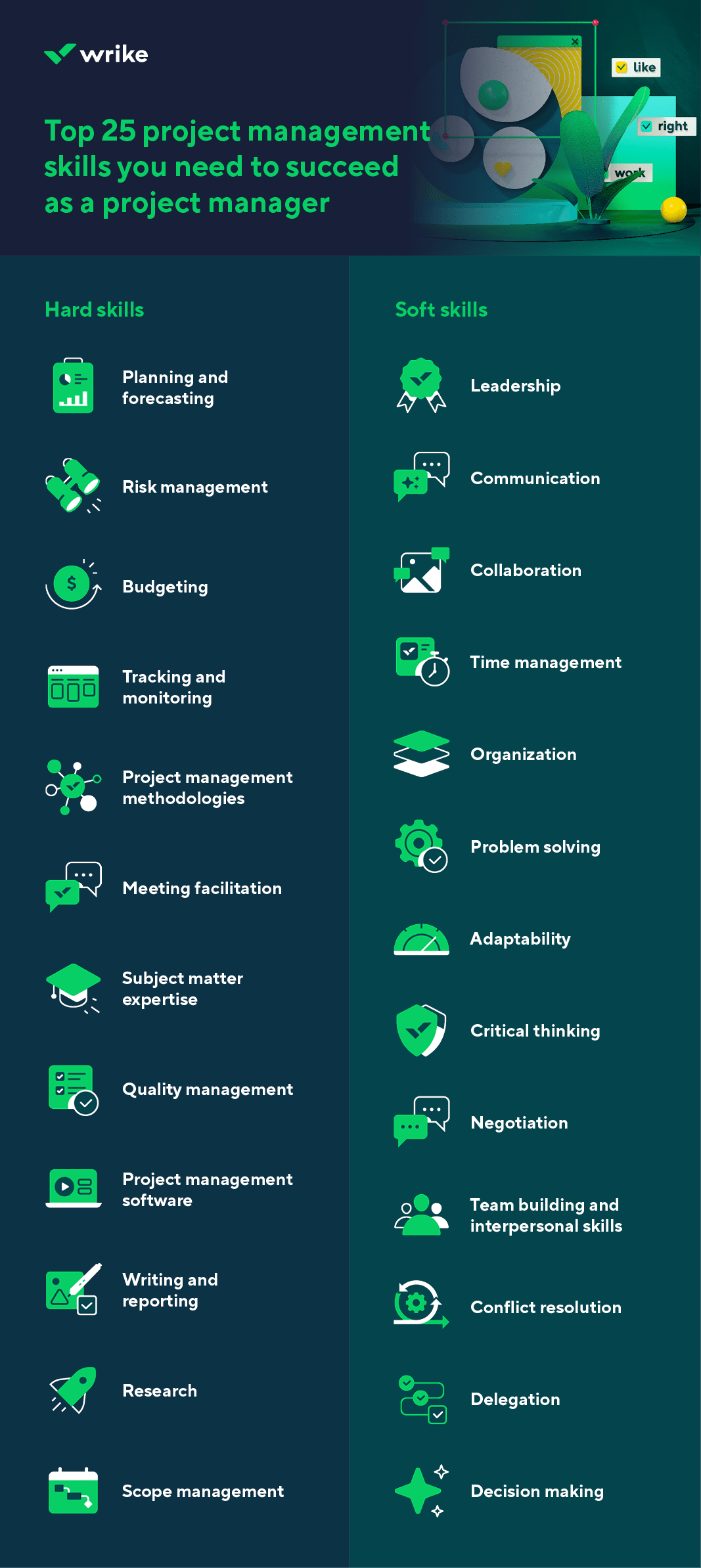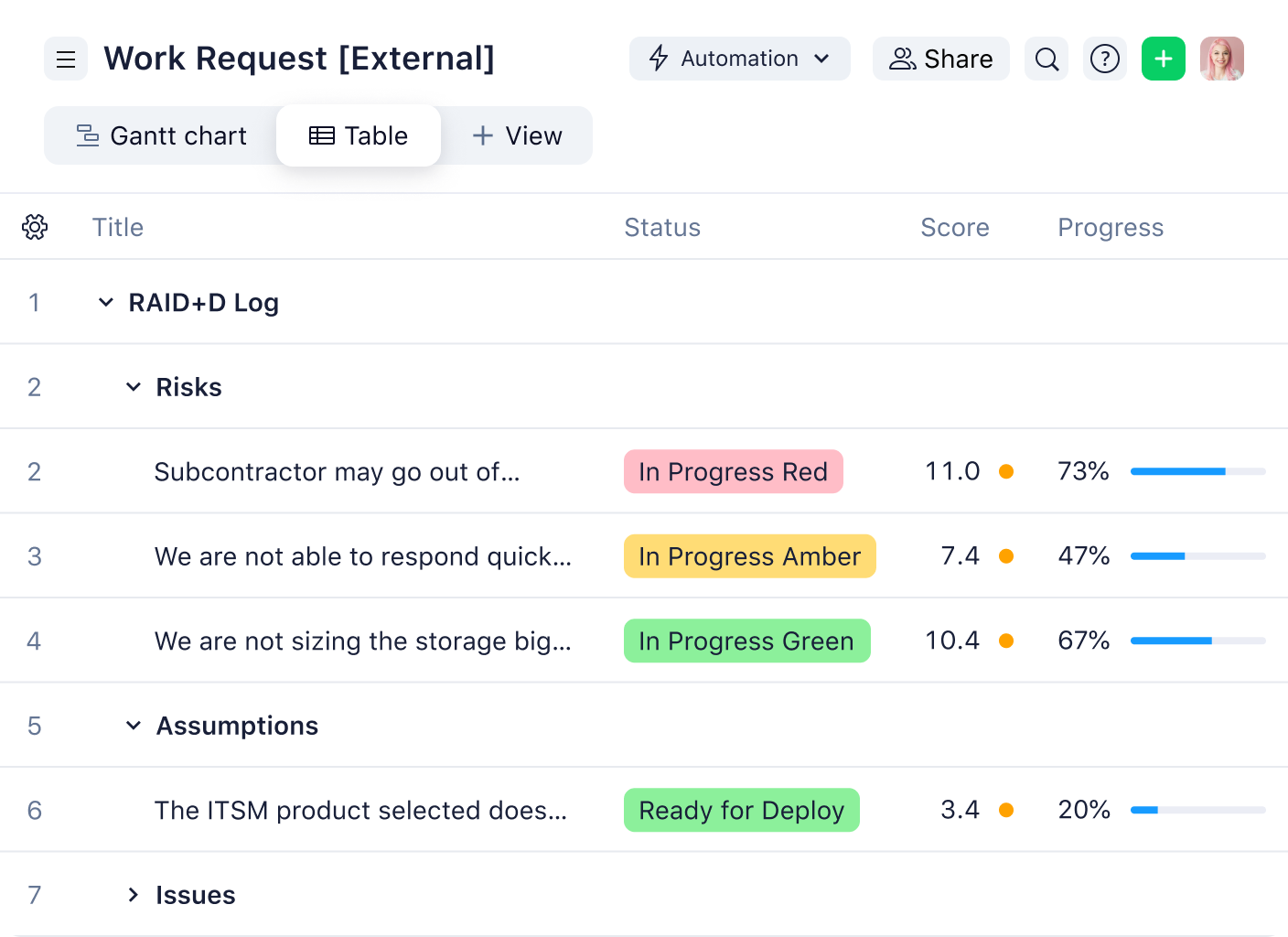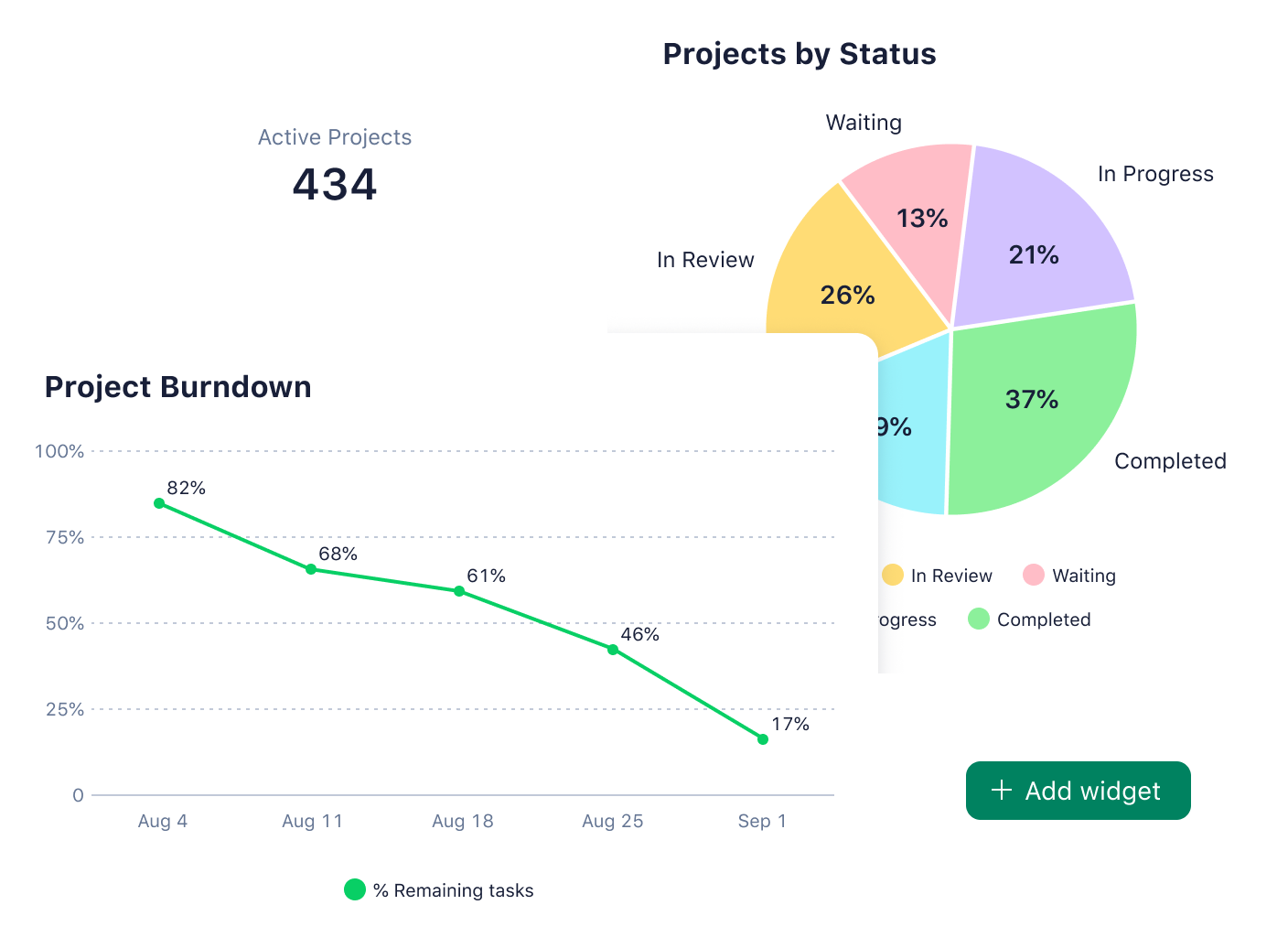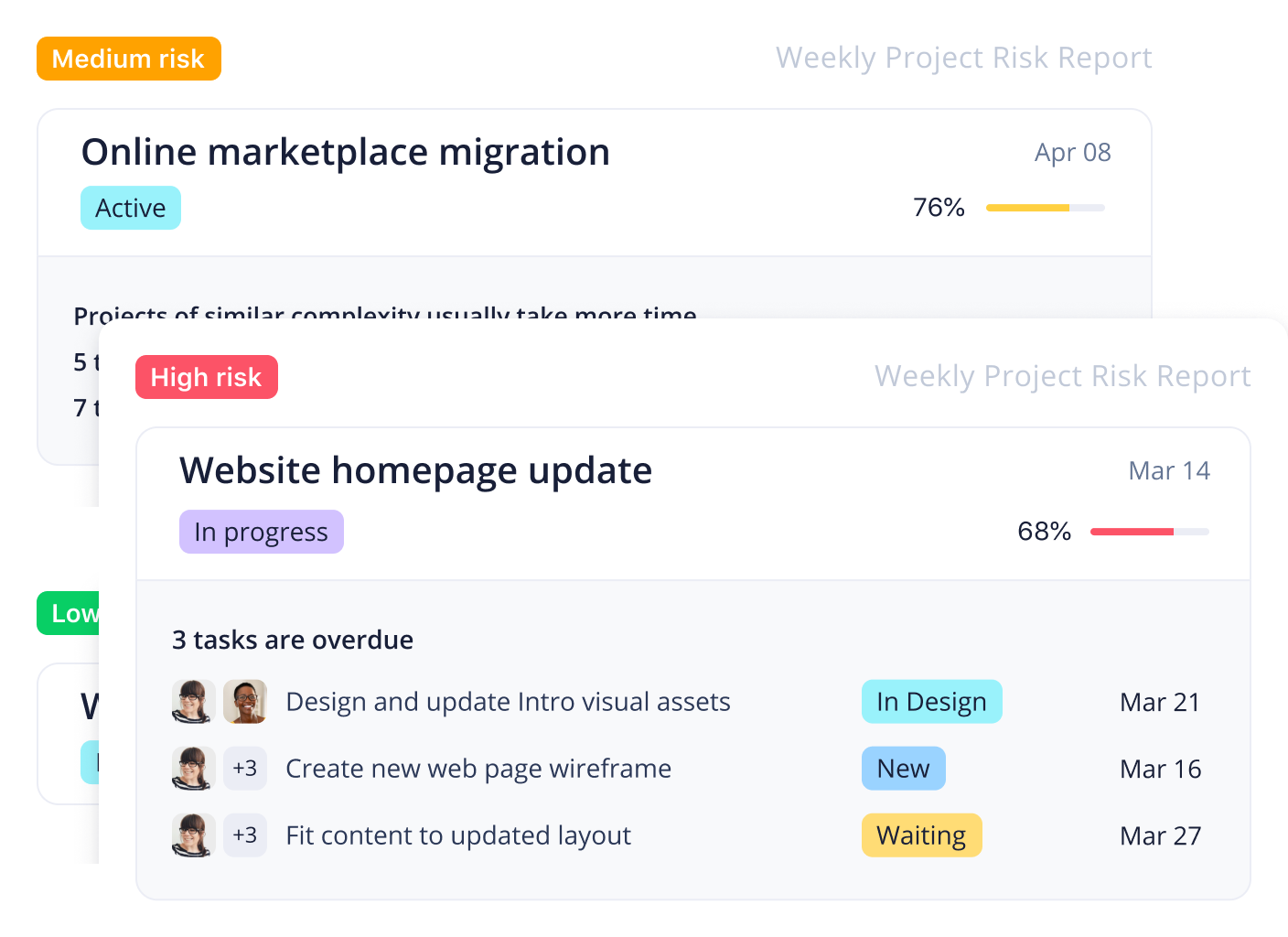What Are Project Management Skills? Top 25
Project management skills are the traits and characteristics that help you take winning projects all the way from idea to completion. Some examples include:
- Planning projects
- Assessing risks and opportunities
- Creating budgets
- Communicating with stakeholders
- Troubleshooting problems
Of course, the skills required to get projects across the finish line are particularly useful for people who want to start or grow their careers as project managers. In fact, good project managers will likely have all the above skills and more.
But these qualities have way broader appeal than that. Everybody — regardless of whether they have a formal project management title or not — is responsible for organizing and leading a project at some point. And when they do, they’ll lean on their project management skills to get the job done.
So, what exactly are the skills of a project manager? How much weight do they actually carry? And how can you develop those skills and set yourself up for success?
We’re answering those questions about project management skills — and plenty more — in this in-depth guide.
Want to skip ahead? You can unlock a free trial with Wrike right now to put all your project management skills into practice and ensure success in one platform.

The top 25 skills you need to succeed as a project manager
This project management skills list will give you the rundown of everything it takes to successfully lead a project.
The skills required for project managers can be multifaceted, so, to keep things a little more organized (you know, just like a project manager would do), we split these key project management skills into two distinct categories: technical skills and soft skills.

Project manager technical skills
Technical skills (which you might also hear called “hard skills”) is a term to describe all of the industry and role-specific knowledge and qualifications you need to manage projects.
These essential project management skills are more quantifiable than soft skills, and are usually obtained through hands-on experience, education, or both.
1. Planning and forecasting
It goes without saying, but proper project management requires skilled planning. It sets the tone for project success. This can be challenging, especially since many project managers need to make educated guesses about timelines and required resources. A successful project manager must also be able to define the project scope.
That’s where forecasting comes into play. Project managers need to use any information they have to make predictions and estimates that are rooted in information, rather than only hunches or gut feelings.
2. Risk management
Every project has risks. Perhaps a resource won’t be available when you need it, or delayed approval from a client will set your timeline back a few days.
An effective project manager is one that takes responsibility for not only navigating around risks but anticipating them so that they can try their best to avoid them altogether (or, at the very least, adequately prepare for them).

3. Budgeting
The truth is that a project can hardly be chalked up as a success if it comes in way over the initial budget.
Balancing financial constraints while maintaining quality is a hallmark of good project managers. They know there are financial constraints they need to work within, and they use their budgeting and financial management skills to deliver winning projects within those limitations.
4. Tracking and monitoring
Project management isn’t just about completing a project — it’s about completing a successful project. That won’t happen if project managers fail to keep their fingers on the pulse of how the project is progressing.
They need to use their performance tracking and monitoring skills to ensure projects are running according to plan and still supporting the broader business goals. If not? They’ll course correct when necessary to ensure they hit those project goals.
5. Project management methodologies
From Agile to Waterfall, there are numerous project management methodologies and approaches. These outline specific principles for overseeing and completing different projects.
Experienced project managers are familiar with the right project management methodologies and can determine which ones are the best fit for their specific teams and projects.
6. Meeting facilitation
Kickoff meetings, status updates, retrospectives — the typical project process has many meetings, most of which are led by the project manager. Yet knowing how to facilitate productive meetings is an often overlooked skill for project managers.
A project manager must have great communication skills to carry out meeting activities, including creating an agenda, guiding conversations, documenting notes, and following up on action items.
7. Subject matter expertise
Project managers work in a variety of industries, from construction to IT to marketing and everything in between. While it’s not an absolute necessity, it’s helpful for the project manager to have a basic familiarity with the industry and the types of projects they’re managing.
This level of expertise will help them more accurately estimate risks, costs, timelines, and resource requirements.
8. Quality management
Pretty much anybody can get a project over the finish line if they don’t care about the quality of the work. But a successful project manager will pay close attention to the project’s standards to ensure the final product meets or exceeds those expectations.
That’s why quality management skills are so important. Project managers will keep a close eye on a project’s progress to ensure that all of the different steps and deliverables meet their quality standards. If and when they see a problem, they’ll take the appropriate corrective steps on the spot — rather than doing a bunch of rework at the end, which could delay the project.
9. Project management software
According to Wrike’s 2024 Impactful Work report, 85% of businesses that invested in project management software experienced an increase in efficiency. The best project managers know better than to try to coordinate all of the elements of a project with jumbled spreadsheets and random task lists.
Instead, they’re experts at using project management software like Wrike to centralize communication, streamline collaboration, and iron out project plans. And what’s more? They’ll educate and encourage other project stakeholders to use the software for effective team management.
10. Writing and reporting
From project plans to status updates, project managers do a surprising amount of writing. They need to be skilled at sharing written information in a clear, organized, and digestible way.
Reporting also falls under the writing umbrella. Whether it’s a resource report or a progress report, project managers will spend a lot of time gathering information about a project and compiling it into a summary that all team members and stakeholders can easily process and understand.

11. Research
While project management does involve some guesswork, those guesses are typically educated. Project managers ground their estimates and assumptions in past experiences and data. That involves a lot of research.
Whether they’re analyzing how similar projects were completed successfully in the past or digging into a different type of project management methodology that could be a better fit for a specific project, project managers need to be skilled at finding new and relevant information.
12. Scope management
The words “scope creep” are enough to cue a horror movie soundtrack in the mind of any project manager. Projects can quickly balloon out of control, causing problems with the budget, resources, and timeline.
Project managers are the ones responsible for reining in projects when they start to expand beyond initial requirements and expectations. That involves proactively spotting issues, reinforcing expectations, and successfully communicating what’s in and out of scope for a particular project.
Project manager soft skills
Soft skills (which you might also hear referred to as “interpersonal skills” or “people skills”) are the qualities and behaviors that help you successfully interact and work with other people. And they’re vital if you need to manage a project.
From communication to problem solving, these types of key skills are a little tougher to assess and quantify than technical skills. However, they’re equally (if not more) important — especially for project managers who are responsible for bringing so many different people together.
13. Leadership
Project managers are the project leaders and often the team leaders too. That’s why they need the right leadership skills — to inspire and guide teams toward the project goals.
As a project leader, you’re responsible for setting the team’s vision and ensuring everyone is on board and motivated to bring the project through each phase. This requires buy-in from executives and project team members.
These leaders should also equip people with the time, tools, and other resources they need to handle their to-do lists.
14. Communication
According to the Project Management Institute, “about 90% of the time in a project is spent on communication by the project manager.” It’s why you’ll see communication on any project management skills list you come across.
Project managers need to ensure that team members and stakeholders are informed about the project plan, timeline, and budget and that they stay updated on the project’s latest happenings. They can do this through both written and verbal communication.
15. Collaboration
It typically takes a village to complete a project. The project manager is tasked with rallying team members around the project vision, coordinating tasks, and ensuring that everybody works together effectively.
To make that happen, a project manager must be a skilled collaborator. This also involves conflict resolution (which we’ll talk about in detail a little later), as occasional project-related disagreements are unavoidable.
16. Time management
Every project manager will have numerous demands placed on their time — especially since they’re acting as the point of contact for so many departments and team members.
To stick to the project schedule, they must be able to manage their own time and the time and capacity of all of the project’s key players.


17. Organization
Deadlines, resources, task dependencies — it’s enough to make anybody’s head spin, but a project manager views it as a fulfilling challenge.
Juggling various project management roles requires excellent team organization. The best project managers are exceptionally organized and can keep track of all the moving pieces.
18. Problem solving
As much as you’d like to think that your project will go off without a hitch, unexpected issues are bound to crop up.
Project managers can’t be discouraged by a problem or an unanticipated hiccup. Instead, they need to develop solutions to keep the project moving forward — even when the best-laid plans fall apart.
19. Adaptability
Adaptability is a key aspect of change management. Simply put, project managers need to be adaptable.
While planning is a core skill, they can’t be so rigid with their strategies that everything runs off the rails the moment something unanticipated happens.
Successful project management professionals can rebound quickly, roll with the punches, and find ways to keep the project moving forward as circumstances inevitably change.
20. Critical thinking
Whether a project falls behind schedule or a necessary resource is unexpectedly unavailable, project managers will undoubtedly find themselves in a variety of tricky situations.
Related to problem solving, they’ll need to use critical thinking to work through the scenario, gather as much information and evidence as they can, and then make judgments about the best way forward. They don’t have a knee-jerk reaction — their critical thinking skills enable them to respond reasonably and rationally.

21. Negotiation
While a project plan might seem relatively straightforward, there’s actually a lot of back-and-forth involved in agreeing on deliverables, timelines, and everything in between. That’s why project managers need strong negotiation skills.
From talking about prices with different vendors to compromising on expectations between two teams, project managers will keep a level head and constantly advocate for the project’s success — without ruffling too many feathers in the process.
22. Team building and interpersonal skills
You can think of a project manager as the glue that holds the entire team together. So, it goes without saying that teamwork and interpersonal skills are crucial for helping work go smoothly.
A lot of the other soft skills on this list — like communication, collaboration, and problem solving — play a critical role in team building as a whole. But to sum it up, project managers need to be constantly aware of what’s in the best interests of the team and the project.
23. Conflict resolution
Crossed wires, dropped deadlines, misaligned expectations — frustration and finger-pointing can easily escalate on a project team without a skilled project manager there to help work through inevitable conflicts.
When problems and disagreements arise, project managers will rely on their conflict resolution skills to stay cool, calm, and collected and help the feuding teams or people talk about their issues and agree on a mutually beneficial solution.
24. Delegation
As a project manager, you’re the one leading the project, but you’re usually not the one actually rolling up your sleeves and doing the hands-on project work. To deliver a great project, you must know when and how to assign tasks to team members.
It sounds easy to hand off work to other people, but project managers know that successful delegation involves clear expectations, actionable instructions, helpful communication, and a willingness to provide guidance or advice when necessary.

25. Decision making
In most cases, project managers don’t have time on their side. They need to make quick and informed decisions to keep projects moving forward.
Decision-making skills help project managers gather the facts, weigh their options, and choose a reasonable way forward without too much dithering that could delay the project.
How can I develop project management skills?
As you reviewed all of the hard and soft skills of a project manager, you probably saw quite a few that you already know you excel in. But you might’ve spotted some others you know you need to learn or refine.
Fortunately, developing the skills you need to be a successful project manager is more than possible. That starts with understanding what skills you already check off and what ones you need to work on.
This level of self-awareness can be difficult, so you can get a better sense of your current skill set by:
- Reflecting on past roles and projects to think about where you thrived and where you struggled. That can clue you in on certain strengths and weaknesses.
- Asking for feedback from past or current supervisors or team members. Sometimes other people have helpful insight into what you bring to the table.
- Taking a formal assessment (Gallup’s CliftonStrengths is a popular one) to identify your biggest strengths.
Once you know exactly where you need to improve, there are plenty of ways to level up your skills:
- Reading: There’s no shortage of resources to help you broaden your horizons and refine your skills. You can grab a project management book and study on your own. Other resources like our blog, eBooks, and even this project management guide will help you lay a solid foundation.
- Taking a course: There are a slew of qualified project management courses from reputable organizations that can improve your skills. The Project Management Institute offers eight different certifications, and professional organizations worldwide offer additional certifications to help you develop your project management skills.
- Finding a mentor: Do you know someone who’s a whiz in an area where you struggle? Connect with them to see if they’re willing to offer some personalized guidance and advice. Don’t be afraid to think outside the box here, either. Project management pulls skills from a variety of different areas, so you don’t necessarily need to look for other project managers to learn from. Your attorney friend could provide great negotiation advice, while your neighbor, a data analyst, could help you step up your critical thinking or reporting capabilities.
- Joining an organization: Organizations like PMI, the International Project Management Association (IPMA), and the Association for Project Management can provide you with tools, resources, and a network of like-minded professionals.
- Familiarizing yourself with a project management tool: A whopping 77% of high-performing projects use project management software, so you’ll need some expertise with a project management platform. You can build that through some hands-on practice, and most project management tools offer free trials so that you can experiment and learn.
Regardless of what methods you choose, remember that learning any new skill takes time. Be patient and persistent, and you’ll steadily gain some ground in improving your project management skills and knowledge.
Are project management skills really important in the workforce?
Here’s the short answer: Yes. And the abilities required for a project manager in the job market aren’t only important if you’re looking for a job with a formal project management title.
Regardless of your role, chances are good that you’ll be leading projects — whether it’s a team initiative or simply a task or responsibility on your own to-do list. Any job requires you to lean on various project management skills to plan, execute, and deliver your work.
With that in mind, it makes sense that project management skills are highly desirable among employers:
- Project management topped the list of most in-demand tech skills (even ahead of software development and product management) in a March 2021 report.
- Project management relies on a lot of soft skills, which are particularly in demand. 93% of employers say that soft skills play a critical role in deciding who to hire for a job.
- Project management is a growing profession, with estimates stating that roughly 88 million people worldwide will be working in project management by 2027.
In short, whether you want to land a new project management job or stand out in a sea of applicants for any other type of role, your project management skills will carry a lot of weight in the job market.
Boost your project management skills with Wrike
So, now you know why developing your project management skills is a worthwhile endeavor. But how can you implement them into your leadership style? Wrike is the answer.
Wrike’s project management software will help you apply these skills in your daily work life, empowering you to guide your teams through any rocky patches. With features such as task management, real-time collaboration, and automated reporting, you’ll have everything you need to be the project manager everyone wants to work with.
Ready to put your project management skills to work? Start your free two-week trial.

Artem Gurnov
Artem is a Director of Account Development at Wrike. He previously held the role of Project Manager, overseeing a team of customer success managers (CSMs). Over the years of building teams and scaling business processes, he has successfully deployed multiple projects, from automating client outreach to setting up work prioritization tools for sales reps and CSMs.


